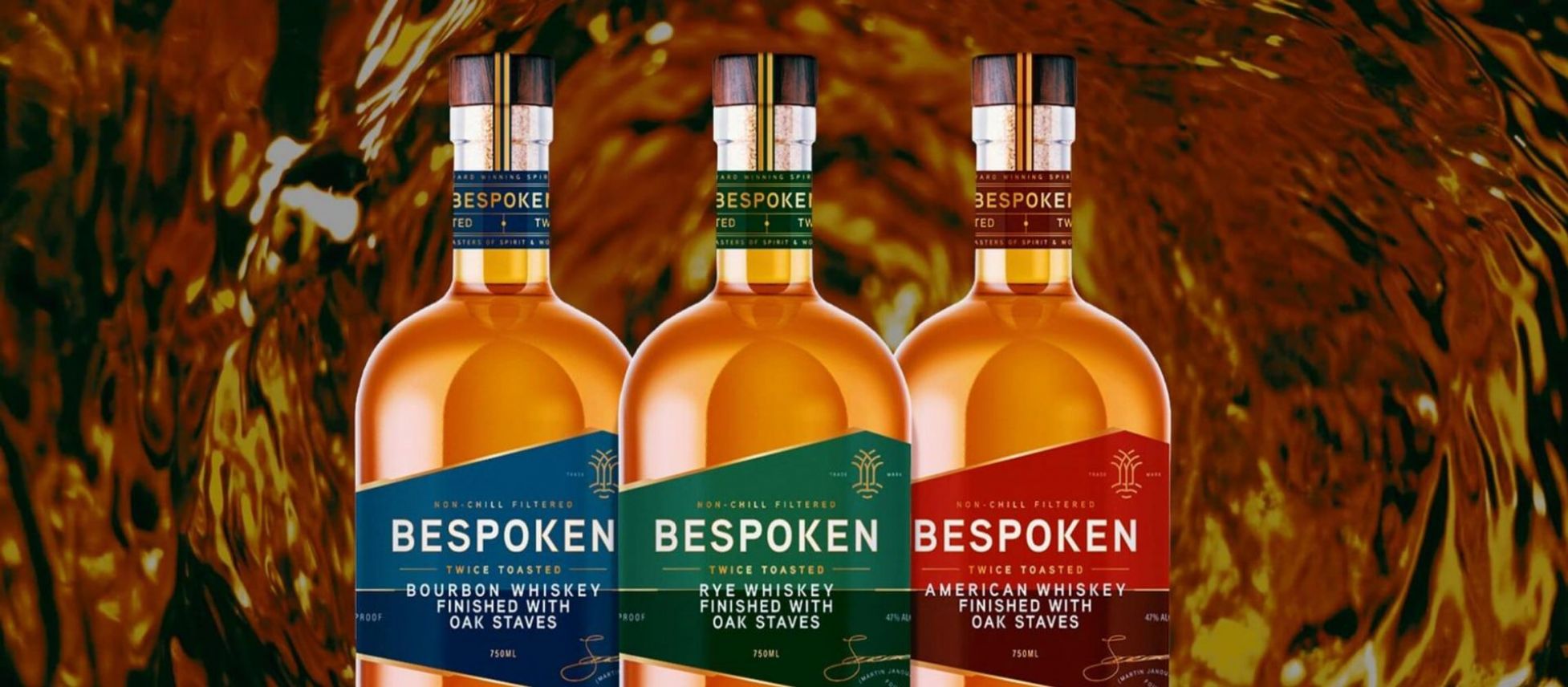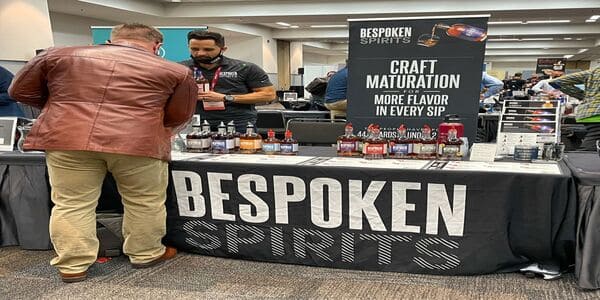Blog
Exhibitor Profiles
Jordan Spitzer’s Blend of Tradition and Innovation at Bespoken Spirits

Jordan Spitzer shares an insight on flavor profiles, precision aging, and the impact of wood selection in development of spirits with the International Bulk Wine & Spirits Show
In an industry rooted in tradition, Jordan Spitzer is pushing boundaries by combining age-old techniques with cutting-edge science to revolutionize spirits-making. With over a decade of experience in the spirits industry, the Head of Flavour at Bespoken Spirits leads the company’s innovation in accelerated maturation and tailored wood finishing. In a conversation with he revealed how tailored wood finishing creates unique, hand-selected flavors using less wood, water, and energy than traditional whiskey. He also emphasized how feedback from trade shows and competitions helps refine Bespoken’s internal flavor development.
Edited excerpts from the interview
1 - Tell us about yourself and your role.
I earned a degree in Food Science from the State University of New York's College of Agriculture & Life Sciences and have over a decade of experience in the spirits industry. I have also served as the founding Master Rectifier for Bespoken Spirits since its founding. In this role, I lead the Bespoken Whiskey Science working group, focusing on reimagining the maturation process by deconstructing the barrel to understand the interactions between the spirit, wood, and surrounding environment. I’ve led research on accelerated maturation engineering through thousands of experiments in oak selection, toasting and charring techniques. Our small batch, commercially available accelerated maturations began winning multiple Gold Medals in competitions since 2019 in various spirits categories.
2 - What inspires your flavor creations? Do you draw inspiration from sensory experiences, industry trends, or other sources?
Many of our creations are inspired by a combination of our innovative processes and wood types. When we come across an exciting new spirit, we have our R&D lab characterize it and see how our tailored wood finishing can be applied to reverse engineer that spirit. We also produce a range of spirits for other companies through our bulk and private label services. In those cases, we defer to the flavor preferences of our customers, which, based on the subjective nature of sensory preferences, can be quite diverse.
3 - Given Bespoken Spirits' diverse portfolio, How do you tailor flavor development for such a diverse range of spirits?
At Bespoken, we tailor flavor profiles by understanding all relevant raw materials and processes used in traditional maturation and then leveraging that knowledge in the maturation processes used in our tailored wood finishing. This includes understanding a range of wood types, toast & char levels, warehouse climates, storage techniques, and so on, and using this information to create a Bespoken formula that can be applied to a specific class and type of spirit.
4 - How do you balance creating innovative, unique flavors while still maintaining the core qualities that consumers expect from traditional spirits like whiskey, rum, or gin?
The key to balance between raw spirit and wood is understanding the principles of optimized wood selection and extraction. We have developed these over six years and undertaken a plethora of DOEs (Design of Experiment), which use statistical modeling to help us determine, for a set of input and output variables, the most optimal set of samples to run to get statistical significance in understanding the relationships among the variables. For example, we might want to use a lower wood concentration for a gin than we would use for a whiskey, and we might want to use a lighter toast for a brandy than we would use for a rum.
5 - Bespoken Spirits use innovative techniques like precision aging to develop flavors. How does this technology enhance the flavor profile of your spirits compared to traditional aging methods?
Bespoken’s tailored wood finishing allows us to impart some of the best flavors from the wood in a shorter amount of time. We do that by taking advantage of certain environmental & innate parameters in the maturation process, including temperature, pressure, agitation, headspace and surface area. Possibly the most important factor is surface area. Through the use of our Microstaves over a traditional barrel, we can impart roughly 30x more wood contact surface area throughout the process.

Image Source & Title: Bespoken Spirits, Bespoken Spirits at International Bulk Wine & Spirits Show 2021.
6 - How does the use of wood and other materials in your aging process influence the flavor profiles of your spirits? Are there any particular woods that you find especially effective?
The selection and use of wood is critical for Bespoken’s finishing process. We primarily use American and French Oak with medium or medium-plus toasts. American Oak can provide notes such as vanilla and dill, whereas French Oak can provide notes such as mocha and stone fruit. Charring the wood helps provide furfural compounds, which give us the caramel and nutty notes that many of us associate with Bourbon and American whiskey. We also use cherry wood for fruity notes and other exotic woods include Mizunara Oak from Japan, which is highly deep and floral, as well as Amburana wood from Brazil, which is intensely sweet and cinnamon-forward. While every wood type has its ideal use depending on the type of spirit and/or target flavor notes, we have found that a medium-plus toasted French Oak is the best wood for finishing for a wide range of applications.
7 - As Bespoken Spirits continues to win awards, how do you see these awards helping to drive future collaborations with distributors, retailers, or even in private-label partnerships?
Our award wins bring strong validation and credibility to our finishing process and resulting spirits. Our process is still novel and not widely known by the masses yet, and perhaps misunderstood by some who do know it. Certain competitions hold more weight for consumers and help get our brands into distribution and retail, whereas other competitions hold more weight for other distillers and producers, and help us sell our spirits as bulk or private label offerings.
8 - What challenges do you face in flavor development when working with large distributors, retailers, and the diverse needs of consumers?
Everyone tastes things differently, which leads to a wide variety of different palates to satisfy and flavor profiles that may be preferred. The biggest challenge for our own brands is trying to find that happy medium for a particular spirit that will please the widest audience. When creating spirits for bulk or private label clients, we tailor profiles to their distinct needs. We may not always agree with their selection, but in these cases, it’s up to the client to determine what’s best for their audience. It’s also important to remember that our audience and clientele may widely differ from theirs.Trade shows and competitions feedback helps our internal flavor development work, highlighting what is considered to be high-quality both consumers and the spirits industry professionals.
9 - What advice would you give to other companies looking to innovate in the spirits industry, regarding flavor development and production?
R&D should be the top priority for anyone innovating in spirits and, the last thing anyone should do is sell an inferior product that is not sufficiently finished. Never rush the development phase to make a quick buck, instead make sure you have a quality product, ideally one that has earned a prestigious award, or is at least worthy of one. It should sell itself once people get the opportunity to taste it. Additionally, for any work done in product development on an R&D scale, make sure that the methods used to make any given product are scalable to meet the needs of high volume production. If you create the best spirit ever but you can’t find a way to produce it in volume, you will struggle with sales and brand growth.
10 - Are there any particular flavor trends you're currently seeing in the spirits industry that Bespoken Spirits is excited about exploring in the near future?
Exotic woods like Mizunara Oak and Amburana are on the rise, so we are focusing on using them for development. New categories of spirits such as American Single Malt whiskey are also growing. While we don’t currently produce a single malt whiskey, we do use mesquite-smoked single malt in one of our products, Bespoken American Whiskey, which is our American take on, and homage to, blended Scotch. Tequila and Agave spirits are also trending, and we created an Agave spirit – a silver Tequila finished with ex-Bourbon staves which won Double Gold at the San Francisco World Spirits Competition. Due to labeling challenges, since it cannot be called Tequila, we never launched it. Nevertheless, we’re excited to see what’s next in flavor trends and try to figure out ways to incorporate them, the Bespoken way.
Conclusion
Jordan Spitzer's innovative approach to flavor development and wood selection is reshaping the way spirits are crafted. By blending science with artistry, Bespoken Spirits can accelerate the aging process while preserving the depth and complexity that define high-quality spirits. As the company continues to win awards and explore new flavor trends, it's clear that the future of spirits lies in embracing both tradition and innovation.
IBWSS SF, July 29-30, 2025 can be one such platform where you can learn about emerging trends and network with industry professionals. It is a must-attend event for anyone in the bulk wine and spirits industry.
Header Image by: Bespoken Spirits
Related Links:
Top Bulk Spirits Industry Trends to Watch in 2024-25
Mastering the Spirits Industry with Nick Scarff
[[relatedPurchasesItems-62]]
If you're a bulk wine or bulk spirits supplier, contract bottler, or private label producer aiming to connect with serious trade buyers, IBWSS San Francisco is the event you can't afford to miss. Get a quotation or Book a exhibitor table.

